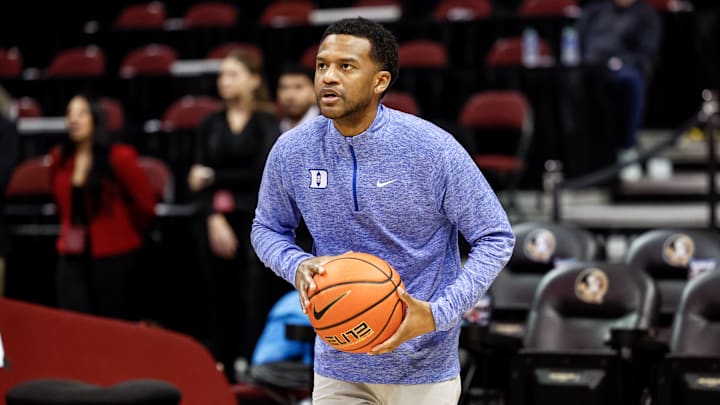Miami has a new head coach and, soon, men's college basketball may have a new bracket. Ross Dellenger has reported for months that NCAA leaders are negotiating with CBS and Warner Bros. Discovery on expanding the Division I men's tournament. The latest framework being discussed is a 76-team field that would debut in 2026-27, after the upcoming season. The change would add an "opening round" before the traditional Round of 64.
Executives are inching closer to an agreement to expand the NCAA tournament to 76 teams with a 12-game “opening round” played at two sites starting in 2026-27.
— Ross Dellenger (@RossDellenger) October 2, 2025
If it gets finalized, how will it work?
More in our weekly sports biz column for @On3Sports -https://t.co/nZ4ncpSX62
Here's how the proposed bracket would work: Instead of the current First Four, the NCAA would stage 24 teams in 12 opening-round games across two sites over Tuesday and Wednesday of week one — Dayton (the long-time home of First Four) plus a second, likely Western, venue. The 12 winners would advance to join 52 already-placed teams, preserving a 64-team first round that begins Thursday and Friday. The selection logic is similar to today's approach: the lowest-seeded automatic qualifiers play each other, and the last at-large teams play each other. In effect, eight at-large teams that were previously "safe" would now be pulled into the opening round, and eight new at-large teams would enter via expansion.
President Charlie Baker has said the priority is wider access for teams squeezed out by 32 automatic bids, and he's downplayed the idea of a windfall from TV partners — saying new money would mostly cover expansion costs (travel, staging games, and paying out opening-round "units"). Practically, that means more bubble teams get a path in, while the main bracket keeps its 64-team opener that fans know. But while the NCAA's public rationale is that this isn't a cash grab, many fans will feel like it is if this becomes final.
CBS and Warner Bros. Discovery (TNT Sports) control Men's March Madness through 2032 and are the parties working with the NCAA on how an expanded week would fit their schedules. But also something to watch: Paramount Skydance, CBS's new parent, has signaled interest in acquiring Warner Bros. Discovery, which — if it advanced — could eventually put both March Madness partners under the same roof.
What about the money that actually reaches schools? The NCAA's unit system pays conferences for each tournament game played up to the Final Four, including the First Four. Those payments accrue over six years and typically sum to roughly $2 million per unit across that period (the per-year share fluctuates). The association has also proposed tweaks to how first-game units are categorized between automatic qualifiers and at-larges. If opening-round games are added, they would still generate units — just as the First Four does now.
What this means in basketball terms
- More bids without blowing up the bracket. A 76-team field increases access while keeping the Thursday/Friday wall-to-wall feel intact. The trade-off is shifting more bubble-quality at-large teams into a play-in environment mid-week.
- Travel and prep are real costs. An extra neutral-site game 48–72 hours before the Round of 64 shortens scouting and recovery windows, especially if the opening-round sites are split.
- An argument presents itself: While power conferences get more at-large inventory and one-bid leagues preserve their AQs, which should occupy those new play-in seats?
How it could help Miami
- There's some bubble insurance here. Lucas has been hired for his recruiting and roster-building chops. If the Hurricanes land on the bubble in his early seasons, a larger field meaningfully improves the entry odds for the Hurricanes, especially if Miami's schedule strength sits well with the committee.
- The opening round would produce winnable, revenue-bearing games. A victory there both advances Miami and earns the ACC a unit that pays out over six years.
- An extra NCAA game offers national TV exposure for Lucas and company. That matters in recruiting, where he's already been positioned as a high-end talent getter and culture builder in Coral Gables.
How it could hurt Miami
- If Miami lands in the opening round, the path is steeper: fly out early week, play a high-pressure game, then turn around to face a rested opponent on Thursday or Friday. That adds fatigue and risk for teams seeded near the cut line.
- Expansion pulls eight previously safe at-large teams into play-in slots. A Hurricanes team projected as, say, an 11-seed could be relegated to an opening-round coin-flip instead of getting the clean runway of a locked Round-of-64 matchup.
- While the ACC stands to gain bids overall, the last four to eight at-large chairs become more contested and the committee's emphasis (quality wins vs. predictive metrics vs. Q1/Q2 splits) will decide who flies to Dayton or the Western site.
